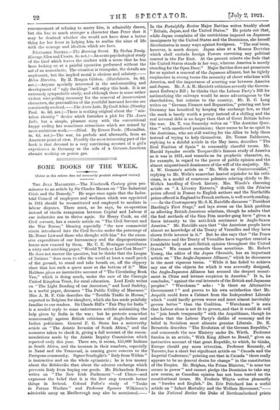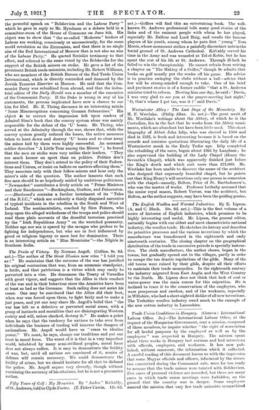SOME BOOKS OF THE WEEK.
[Notice in this column does not necessarily preclude subsequent review.]
TRE JULY MAGAZINES.—The Nineteenth Century gives pro- minence to an article by Sir Charles Macara on "The Industrial Crisis and the Remedy." He urges once again that the Indus- trial Council of employers and workmen which was appointed in 1911 should be reconstituted and employed to mediate in labour disputes. There must, as he says, be co-operation instead of sterile antagonism between Capital and Labour if our industries are to thrive again. Sir Henry Craik, an old Civil servant, has a caustic article on "The Civil Servant and the War Bonus," blaming especially "the new commercial strain introduced into the Civil Service under the patronage of Mr. Boner Law and those who thought with him" for the exces- sive expenditure of our bureaucracy and the disproportionate bonus now exacted by them. Mr. C. E. Montague contributes a witty and searching paper," Would Truth or Lies Cost More?" He does not answer the question, but he thinks that the League of Nations "does seem to offer the world at least a small patch of flat ground, to stand and take breath on, off the slippery slant that has such a queer mess at the bottom of it." Miss Haldane gives an instructive account of "The Circulating Book Van," which is doing much, under the care of the Carnegie United Kingdom Trust, for rural education. Lord Ernie writes on "The Light Reading of our Ancestors," and Lord Sudeley, in a useful paper, discusses "The Public Utility of Museums." Miss A. M. F. Cole describes the "Terrible Traffic in Horses," exported to Belgium for slaughter, which she has made painfully familiar to our readers. Sir Claude Hill's "Fair Play for India" is a needed reply to some unfortunate articles minimizing the help given by India in the war ; but he protests somewhat unnecessarily against British criticisms of Anglo-Indian and Indian politicians. General F. G. Stone has a noteworthy article on "The Asiatic Invasion of South Africa," and the measures taken to cheek it, giving a full account of the recom- mendations made by the Asiatic Inquiry Commission which reported early this year. There are, it seems, 155,000 Indians in South Africa, and the increase in their numbers, especially in Natal and the Transvaal, is causing grave concern to the European community. Signor Scarfoglio's " Italy from Within" is instructive and on the whole optimistic ; he is less uneasy about the Bolsheviks than about the adverse exchange which prevents Italy from buying our goods. Mr. Richardson Evans writes on "The New Irish Parliament "—of Ulster—and expresses the belief that it is the first step towards better things in Ireland. Colonel Fuller's study of "Tanks in Future Warfare" and Professor Spenser 'Wilkinson's admirable essay on Marlborough may also be mentioned.— In the Fortnightly Review Major Battine writes frankly about "Britain, Japan, and the United States." He points out that, while Japan complains of the restrictions imposed on Japanese immigrants by the United States and the Dominions, she herself discriminates in many ways against foreigners. "The real issue, however, is much deeper. Japan aims at a Monroe Doctrine which shall exclude foreign Powers exercising any political control in the Far East. At the present minute she feels that the United States stands in her way, whereas America is merely standing for the Open Door." Major Battine does not pronounce for or against a renewal of the Japanese alliance, but he rightly emphasizes in strong terms the necessity of closer relations with America, and the importance of averting war between America and Japan. Mr. J. A. R. Marriott criticizes severely the Govern- ment Railways Bill ; he thinks that the Labour Party's Bill for nationalizing the railways would be more advantageous to the shareholders, but ruinous to the country. Mr. R. C. Long writes on "German Finance and Reparation," pointing out how Germany has benefited by keeping the exchange low, so that the mark is barely worth a penny instead of a shilling and the real internal debt is no larger than that of Great Britain before the war. Dr. T. von Sosnosky writes on "The Austrian Ques- tion" with unrelieved pessimism; there seems to be no spirit in the Austrians, who are still waiting for the Allies to help them instead of trying to help themselves. Dr. Tomas Baldasano, replying to a doleful article in the May issue, describes "The Real Position of Spain" in reasonably cheerful terms. Mr. Harold Spender recalls Tocqueville's famous study of America as it was in 1831, and remarks on its prophetic character, as, for example, in regard to the power of public opinion and the almost unquestioned dominance of the will of the majority. Mr. A. W. Gomme's article on "Mr. Wells as Controversialist," replying to Mr. Wells's somewhat heated rejoinder to his criti- cisms, is a model of courteous polemics relating chiefly to Mr. Wells's handling of Greek history. Mrs. Woods's charming article on "A Literary Entente," dealing with the Femina prizes offered in France to English authors and the Northcliffe prizes offered in England to French authors, is well worth reading. —In the Contemporary Mr. S. K. Ratcliffe discusses "President Harding's First Stage," and lays stress on the Irish problem as affecting British-American relations, though he admits that the foul methods of the Sinn Fein murder-gang have "given a fierce intensity to the anti-Irish sentiment in Anglo-Saxon America." Mr. Ratcliffe says that "the American people have almost no knowledge of the Treaty of Versailles and they have shown little interest in it." But he also says that "the Peace Conference and the Treaty of Versailles have together created a formidable body of anti-British opinion throughout the United States." We cannot reconcile these assertions. Mr. Robert Young, the editor of the Japan Chronicle, has an important article on The Anglo-Japanese Alliance," which he denounces in the most vigorous terms. "While it has failed to achieve any one of the objects for which it was avowedly designed, the Anglo-Japanese Alliance has aroused the deepest resent- ment in China and intense suspicion in America." It is, he concludes, "against the real interests of the British and Japanese peoples." " Watchman " asks : "Is there an Alternative Government?" and proves to his own satisfaction that Mr. Asquith could form a Cabinet from the Independent Liberals which "could hardly govern worse and must almost inevitably govern better" than the Coalition. " Watchman " is sure that Labour alone is not fit to govern, and that it would do well to "join hands temporarily" with the Asquithians, though he admits that the Labour Party's dislike of economy and its belief in Socialism must alienate genuine Liberals. Dr. E. Bernstein describes "The Evolution of the German Republic," and commends the new Ministry under Dr. Wirth. Professor Sarolea in an article, "With King Albert to Brazil," gives an instructive account of that great Republic, to which, he thinks, Europe should pay more attention. Professor Kennedy, of Toronto, has a short but significant article on "Canada and the Imperial Conference," pointing out that in Canada "there really appears to be no general desire for change" in the constitution of the Empire. Mr. Meighen, the Prime Minister, "is none too secure in power" and cannot pledge the Dominion to take any new course, as Canadian opinion has not been tested on the constitutional issues. Mr. Frederic Whyte writes pleasantly on "Swedes and English." Dr. Eric Pritchard has a useful article on "Infant Mortality and the Welfare Movement"— In the National Review the Duke of Northumberland prints the powerful speech on "Bolshevism and the Labour Party" which he gave in reply to Mr. Hyndman at a debate held in a committee-room of the House of Commons on June 8th. His object was to show that "the so-called 'Moderate' leaders of Labour are working, consciously or unconsciously, for the same world revolution as the Extremists, and that there is no single aim of the Red International of Moscow that is not also an aim of the Labour Party." He quoted Socialist testimony to that effect, and referred to the sums voted by the Bolsheviks for the support of the British miners on strike. He gave a list of the prominent British trade unionists, including Mr. Robert Williams, who are members of the British Bureau of the Red Trade Union International, which is directly controlled and financed by the Jewish Terrorist Zinoviev at Moscow. He said that the Com- munist Party was subsidized from abroad, and that the indus- trial editor of the Daily Herald was a member of the executive of the Communist Party. If the Duke is wrong in any of his statements, the persons implicated have now a chance to sue him for libeL Mr. E. Thring discusses in an interesting article "Some Misconceptions concerning German Submarines." His object is to correct the impression left upon readers of Admiral Sims's book that the convoy system alone was mainly responsible for the defeat of the 'U' boats. Mr. Thring, who served at the Admiralty through the war, shows that, while the convoy system greatly reduced the losses, the active measures taken to hunt down and destroy 'Tr boats and to clear away the mines laid by them were highly successful. An unnamed soldier describes "A Little Tour among the Miners " ; he found that the men on strike were very unlike their leaders. "They are much keener on sport than on politics. Politics don't interest them. They don't attend to the policy of their Federa- tions and Unions, or insist on ballots on matters affecting them." They associate only with their fellow-miners and hear only the miner's side of the question. The author laments that such fine men should be so hopelessly misled by ambitious politicians. "Newmarket" contributes a lively article on "Prime Ministers and their Racehorses "—Rockingham, Grafton, and Palmerston. —Blackwood's contains a further instalment of its "Tales of the R.I.C.," which are evidently a thinly disguised narrative of typical incidents in the rebellion in the South and West of Ireland. The sentimentalists, coached by Sinn Feiners, who harp upon the alleged wickedness of the troops and police should read these plain accounts of the dreadful terrorism practised by the "Irish Republican Army" on the wretched peasantry. Neither age nor sex is spared by the savages who profess to be fighting for independence, but who are in fact influenced by greed or religious bigotry or mere lust for domination. There is an interesting article on "Blue Mountains "—the Nilgiris in Southern India,











































 Previous page
Previous page